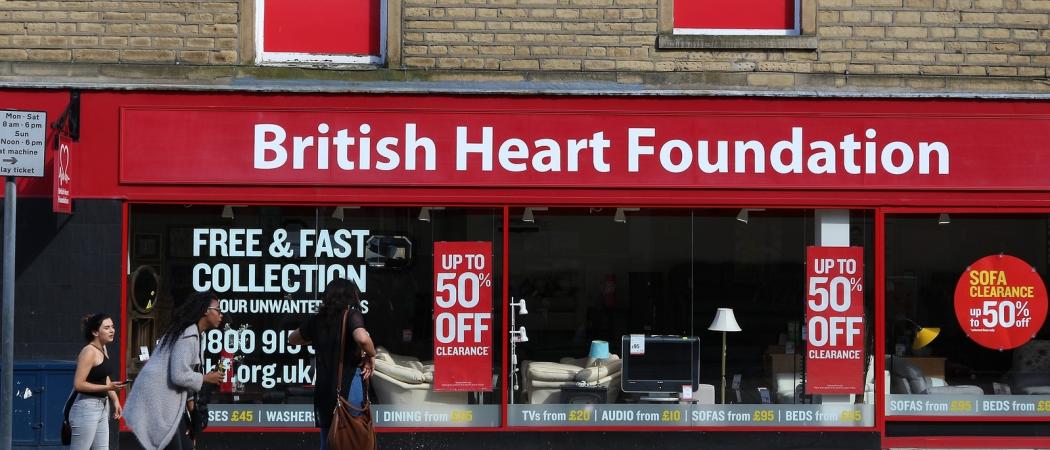Charities that invested £1.9B in biomedical R&D in 2019 warn it will be years before they recover from the effects of COVID-19, with the loss of a generation of young researchers

One of the shops of the British Heart Foundation. Photo: Bigstockphoto.
UK medical research charities are appealing to the government to co-fund a £620 million relief fund to help them weather the 41 per cent fall in incomes they have suffered as a result of the COVID-19 pandemic.
“The impact the crisis is having is immediate with significant long-term repercussions for medical research,” said Aisling Burnand, chief executive of Association of Medical Research Charities (AMRC), a body representing 160 charities that between them put £1.9 billion into R&D in 2019.
AMRC is calling on the government to put £310 million into a Life Sciences Charities partnership fund, to be match-funded with £310 million from the charities and other philanthropic donors.
The pandemic “has put the future at risk” Burnand said. Without government support, it will take four and a half years for spending to return to the 2019 level.
For Michelle Mitchell, head of Cancer Research UK, the largest charitable funder of cancer research in the world, the “devastating” impact of COVID-19 could result in a £150 million drop in research spending in 2020.
“We’re in danger of destroying a decade’s worth of work, infrastructure and talent,” Mitchell said. The charity has already cut £44 million from research this year.
Further cuts “could mean thousands of early stage researchers underfunded. We’re holding back clinical trials, slowing new treatments,” she said. The charity spent £500 million on research last year and a loss of £150 million is the “equivalent of 10 years’ worth of clinical trials going unfunded,” said Mitchell.
As the UK went into lockdown in March, charity shops were closed, fundraising events were cancelled, and donations were diverted to National Health Service charities.
CRUK does not have an endowment and is dependent on its shops, events and donations for all of its income. Mitchell has “every confidence” the public will get back behind the charity, and its income will recover over the next three years. Given this, “We don’t want to make cuts that take ten years to recover from,” she said.
Pioneering projects
The UK government has injected £750 million into charities during the pandemic, but this money has gone to charities providing frontline services, and has not made its way to medical research.
Medical research charities have used the furlough scheme, through which the government pays 80 per cent of staff salaries, but furloughed staff are not allowed to work and with the scheme drawing to a close, charities may have to make people redundant. Burnand noted that the charity Breast Cancer Now has announced redundancies.
Parkinson’s UK, which invests £8 million a year in research, is Europe’s largest non-commercial funder for this disease, said Steve Ford, chief executive of the charity. Income for the charity is projected to fall by 40 per cent in 2020.
“There’s a very real prospect research gets squeezed in the middle,” Ford said. “We can’t continue with pioneering projects to the same extent. It makes a massive dent and is a massive discouragement to young researchers,” he said. The charity is running the world’s biggest long term study of Parkinson’s disease and also funds the world’s biggest biobank of brain samples donated by people who died of the disease.
At the end of April, 74 per cent of the 1,102 clinical trials and studies funded by AMRC charities had been paused. As lockdown restrictions have lifted, trials and studies have resumed, with the number of paused trials dropping to 54 per cent. The delays represent a huge unforeseen overhead for the charities, which have to extend grant terms and pay investigators for longer. Some trials may never restart, the charities warned.
“We face an unprecedented funding crisis; the single biggest challenge in our history,” said Charmaine Griffiths, chief executive of the British Heart Foundation, where income is expected to fall by half, from £100 million to £50 million.
Griffiths said there has been a six-month delay in 30 cardiovascular clinical trials, at a cost of £3.3 million. The charity is losing £10 million a month.
The foundation currently supports a portfolio of £446 million of research projects, at 47 institutions across the UK. This includes funding the posts of more than 1,700 researchers, hundreds of whom are in the early stages of their scientific career.
“This is a crisis for talent,” Griffiths said. “We could lose a generation of researchers because of this shock.”





 A unique international forum for public research organisations and companies to connect their external engagement with strategic interests around their R&D system.
A unique international forum for public research organisations and companies to connect their external engagement with strategic interests around their R&D system.